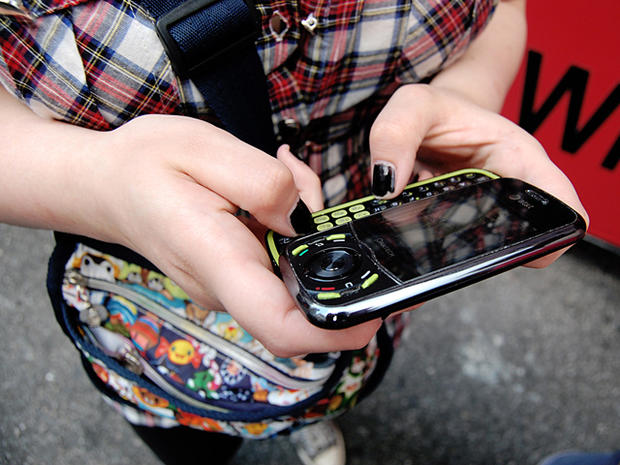Teens keen on sexting racy photos? What new studies show
(CBS/AP) Parents can breathe a sigh of relief. Teen sexting may be far less common than people think, new research shows.
PICTURES - Busted! Sneaky teen texts decoded
Two new studies from the University of New Hampshire Crimes Against Children Research Center looked at the percentage of youth who send pictures that would qualify as child pornography as well as the percentage who are arrested or treated like sex offenders. And they found that concerns about sexting may be overblown.
For one study, researchers asked 1,560 kids nationwide whether they'd shared nude photos online or via cell phone. Only 1 percent of kids aged 10 to 17 have shared images of themselves or others that involve explicit nudity, the study found. Roughly the same number said they'd shared suggestive but less graphic photos; while 7 percent said they'd received either type of picture.
The results are reassuring, showing that teen sexting isn't rampant, usually isn't malicious, and is generally not something parents should panic over, said study author Kimberly Mitchell, research assistant psychology professor at the University of New Hampshire.
Previous reports said up to 20 percent of teens have participated in sexting. But some surveys included older teens and people in their early 20s. And some used definitions of sexting that included racy text messages without photos, or images "no more revealing than what someone might see at a beach," authors of the new study said.
For the second study, researchers sent questionnaires to nearly 3,000 police departments and followed up with phone interviews about sexting cases handled in 2008 and 2009. The study found that few kids are being prosecuted or forced to register as sex offenders for sexting. Nearly 4,000 teen sexting cases were reported, and about one-third of the cases involved teens and young adults. Slightly more than one-third resulted in arrests, with adults much more likely than kids to be arrested.
The studies were released Monday in the journal Pediatrics.
Is all sexting dangerous? Not necessarily - the research shows that it can range from incidents that some teen health experts consider "typical adolescent exploring" - the 21st century version of sneaking a look at Dad's Playboy magazine - to malicious cases with serious consequences.
One 10-year-old boy, for example, sent a cell phone picture of his genitals to an 11-year-old classmate "to gross her out." The girl's mother called police; the boy cried when questioned by police, who said he didn't understand the magnitude of his actions and left the matter to his parents.
Another case involved a 16-year-old girl who said she accidentally posted a nude photo of herself on a social networking site. A 16-year-old boy at her school found the photo and distributed it to 100 people when she refused his demand to send him more nude pictures. He was charged with a felony and was put on probation.
The studies illustrate how sexting includes a wide range of teen behavior, and highlight an issue "about which we as a society have gotten pretty hysterical and probably blew out of proportion," Dr. Michael Rich, director of the Center on Media and Child Health at Children's Hospital Boston, said.
Exploring sexuality is normal behavior for teens and taking pictures of themselves and others is one way "just to find out what it is like," he said. "We've been doing that since somebody scribbled a picture of a nude woman on the side of a cave and the guys gathered around to check it out."
Dr. Victor Strasburger, an adolescent medicine expert at the University of Mexico, said there should be more emphasis on teaching teens to be responsible with new technology, rather than on prosecution. Teens' brains aren't mature enough to fully realize the consequences of their actions, including sexting, until early adulthood, he said. They need to be told that "when you put things online and even when you send them via cell phone, they're potentially there forever."
Parents, schools and law enforcement authorities "need to understand that teenagers are neurologically programmed to do dumb things," he said.

